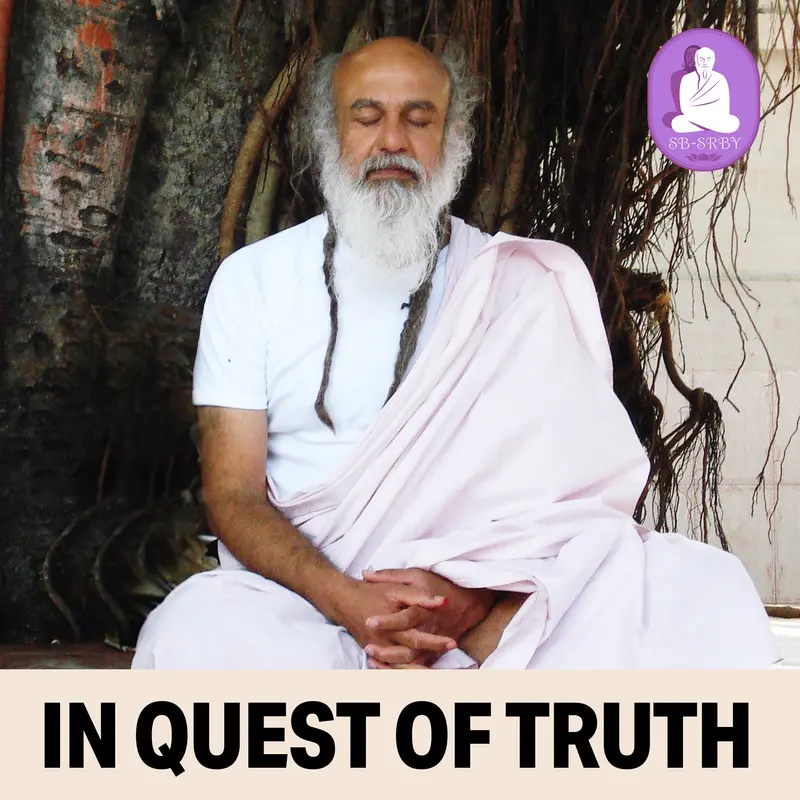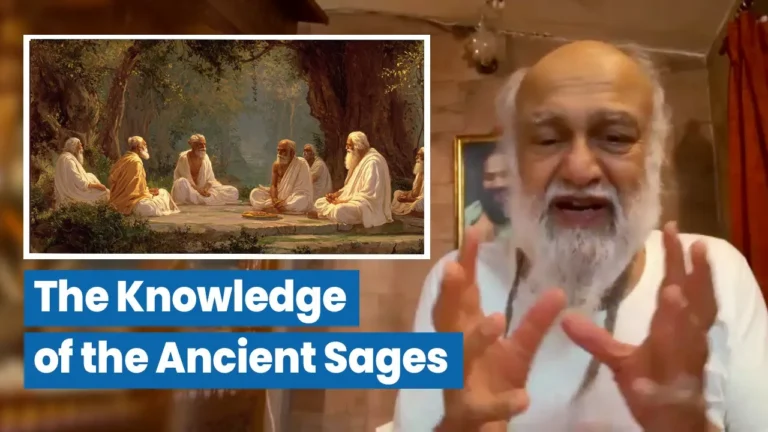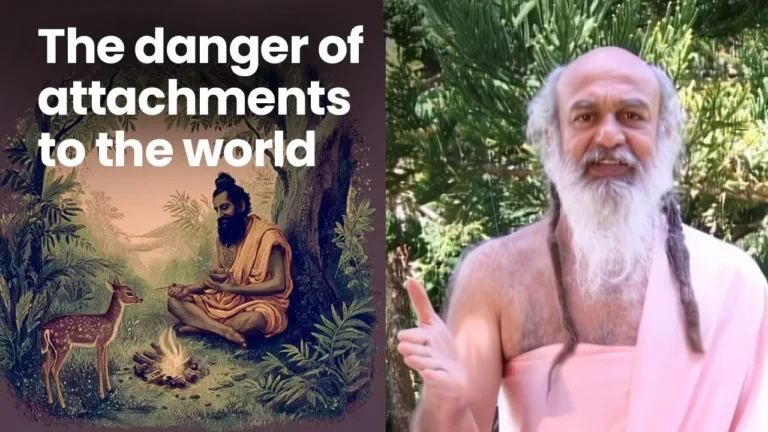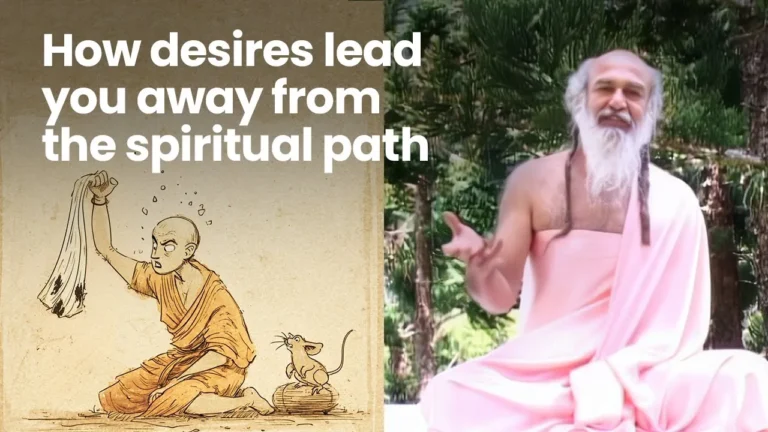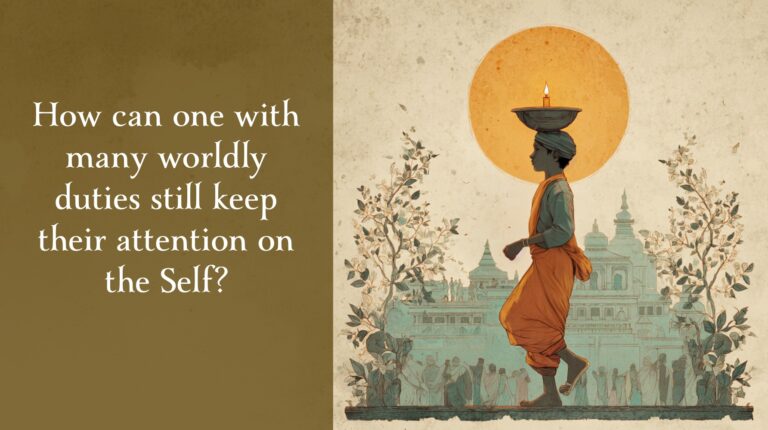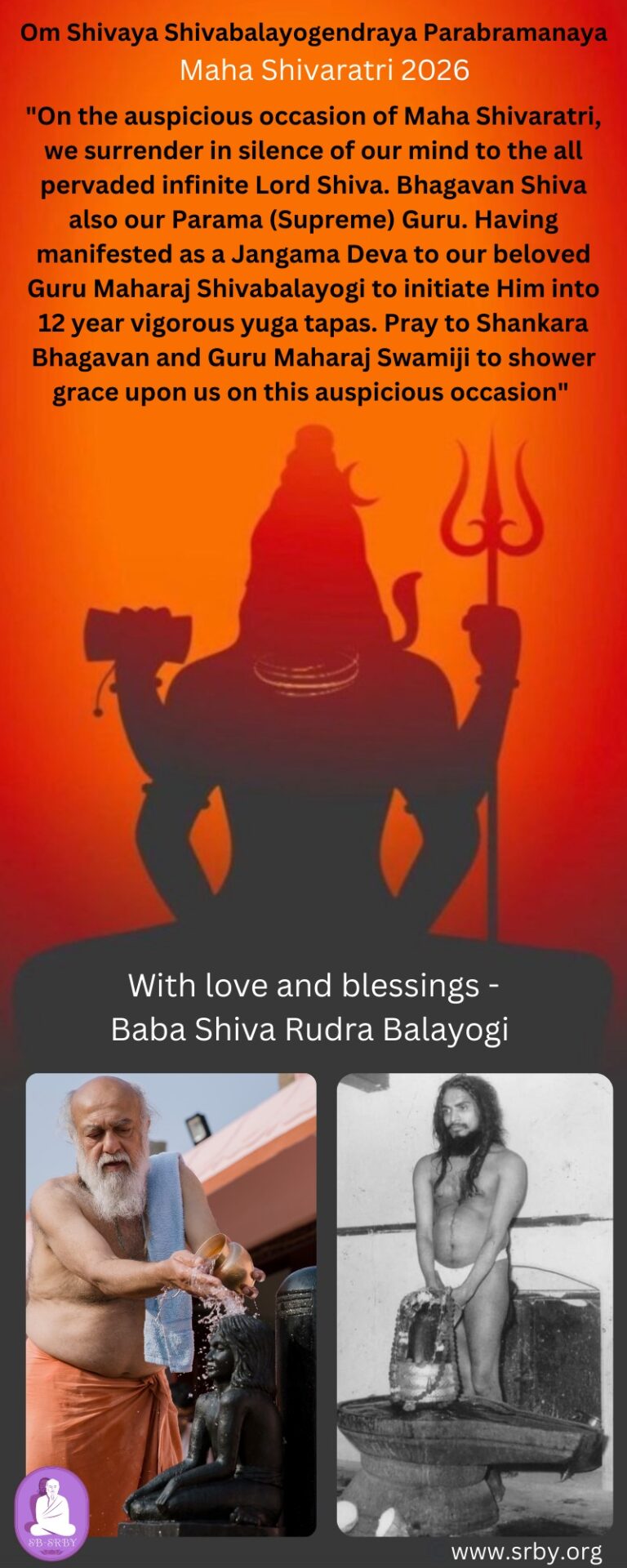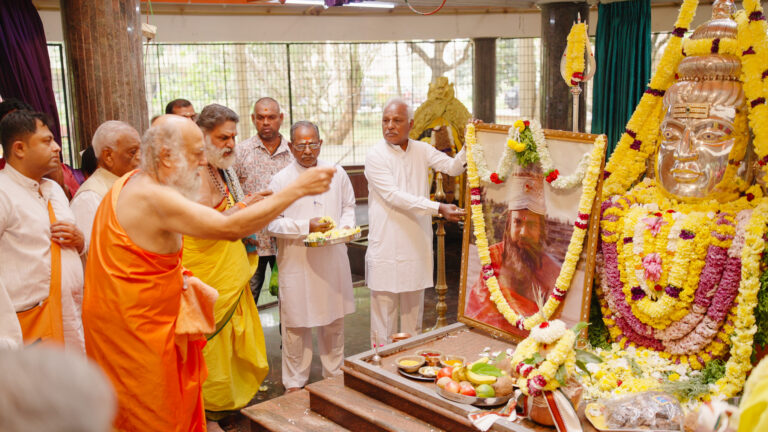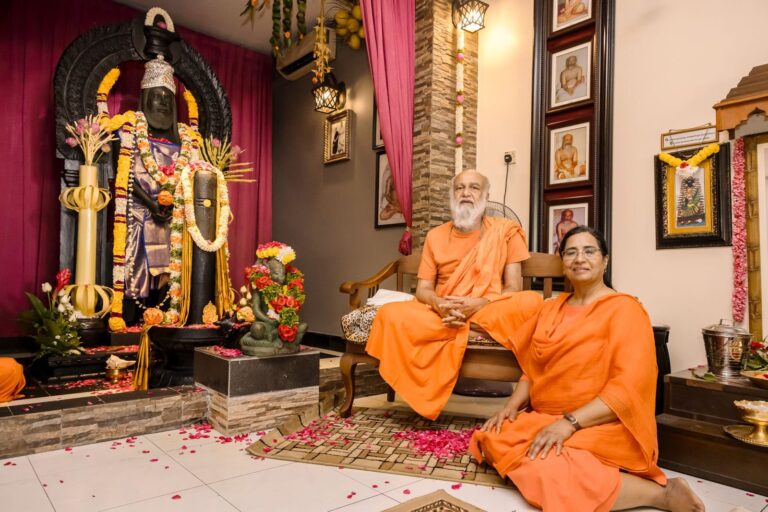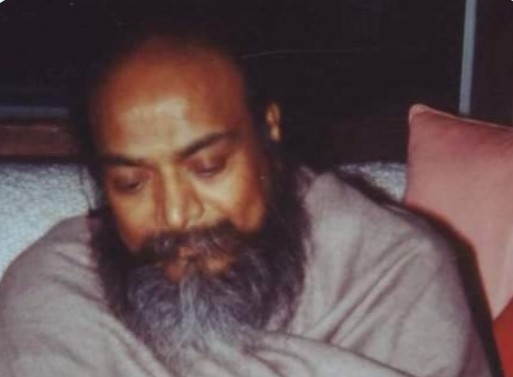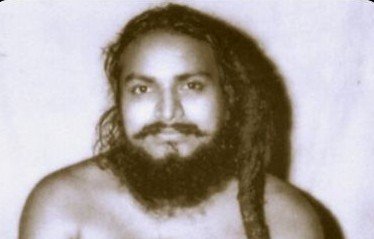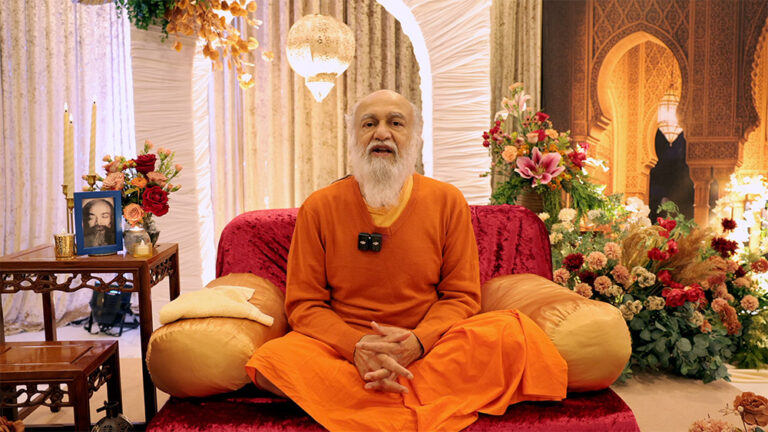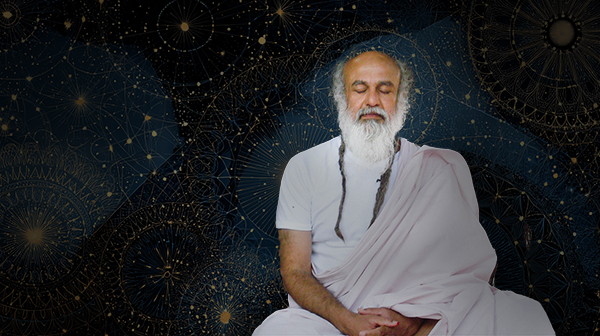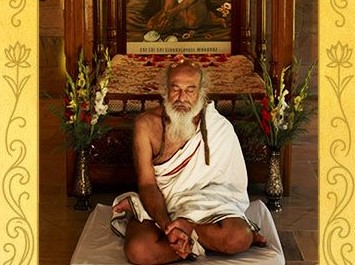The following summary is compiled from public talks by Babaji. It is but a glimpse of the boundless wisdom of a Yogi. Babaji’s teachings are subtle and limitless. He teaches in so many ways, for so many people of different temperaments. His highest teachings are not through discourses, but through the Silence of His Presence and through experiences in daily life.
The Goal of Spirituality
Shri Babaji teaches that there is no third way for the mind – it either runs in this world or becomes quiet and goes introverted toward the Self. Any genuine sadhana (spiritual practice) should enable the mind to recede and become quiet, taking the mind inward towards the Self, the Divine, eventually leading one to the Supreme Peace of Self Realization.
Everyone, consciously or unconsciously, is searching for Peace and Happiness. You are suffering because you have forgotten your Real Self. Once you Realize that you are this Immortal Self, you will Realize that your very existence is Permanent and Supreme Peace.
Shiva Rudra Balayogi (Babaji)
This Self, Babaji teaches, is not merely inside of you or outside of you. You are that Peace and Happiness! Just like the space is both inside the room and outside the room. You are That, and That is all pervading, existing in Itself.
The basic clue is the mind, which is your conscious energy. Just like the sun’s ray is to the sun, mind is to the Self. You cannot show the mind to anybody. It has no shape, no color. Based on thoughts only, you recognize, “My mind wants to do this, my mind wants to do that.” But the actual existence of the mind is Pure Consciousness. It has the ability to become conscious of anything, including Itself; right now it has become conscious of this world.
One of the most powerful convictions of human beings is that there is peace and happiness in this world. You go on looking for happiness in material objects, in relationships, in this world. Has anything ever given you permanent happiness and satisfaction? It is impossible, since the objects of the world are by their very nature transitory. Yet you go on searching in vain for lasting happiness in the world, with the firm conviction that it is there to be found. Like this, for ages, the mind has been wandering in this world like a monkey.
Now if by spiritual exercises you turn this mind inwards; if you make the mind concentrated, automatically it goes introverted and it becomes conscious of the real Self. That is how the ancient Sages of India also determined that we exist as the Immortal Soul, which is beyond the birth and death of this physical body. Ignorance, which is the cause of suffering, will be removed. The mind will settle back into that Self from which it originated, established in the Eternal Peace and Happiness which you have been looking for all along.
This has to be experienced. Nobody else can do it for you. You cannot demonstrate it to anyone else, or define it in words. Just like you cannot simply define what space is, and you cannot measure space by any scale. It is all pervading. It is an amazing thing. If at all you want to measure the space and know the space, you have to become space itself.
Shiva Rudra Balayogi (Babaji)
When the droplet of the mind becomes one with the Ocean of the Self, the imagined individuality – which never really existed – vanishes, and your Eternal Existence is revealed. That is recognized as Self – or God-Consciousness. There is really no difference. Eternally, you will always be there, in your Self. Perfectly secure and content. That is the Ultimate Goal of spirituality.
The Spiritual Path
Babaji teaches that every human being has a triple responsibility – to take care of their physical, mental and moral health. The fulfillment of these responsibilities is the essence of spirituality. By steadfastly following this spiritual path one can ultimately achieve Self Realization. For this Supreme Peace and Happiness put in efforts now; do not wait for miracles. Efforts bring real miracles. It is worth putting in efforts until the last breath of life.
Physical Health
For physical health, a proper diet of light foods and exercises such as yoga asanas (postures) and pranayam (breathing techniques) are prescribed. However, Babaji advises that such physical exercises should not be undertaken for prolonged periods, since one can become too body-conscious and rely too heavily on an external ‘anchor’ such as the breath. The body should be given its due, but no more.
Mental Health
For mental health, different sadhanas are prescribed for the purpose of bringing the mind under one’s control, and keeping it composed, purified and at peace. Sadhana means your efforts to achieve, in this case Self Realization. Babaji encapsulates the primary purpose of all sadhanas in His simple and profound way:
You need to bring your mind under your control and discover who you really are; the greatest wonder and the greatest miracle is when you attain Peace and Realize your existence as the Immortal Soul.
Shiva Rudra Balayogi (Babaji)
Thus, He defines sadhana as any exercise that will naturally – without harming the brain’s health or suppressing its reflections – make one’s mind purified and composed. The mind must recede and go introverted toward the Self – only such a sadhana is genuine and worthwhile. An anchor can be used for this purpose, but eventually one has to go beyond that.
Babaji teaches that dedication, discipline and patience are required for success in any sadhana. If you are dedicated you will take out time in priority. If you are disciplined you will definitely practice everyday without fail. The mind has gone out of control since time immemorial. If you have patience you can definitely achieve. Eventually these sadhanas lead us to Realization of the Self or Divine, which Babaji identifies as simply two different terminologies for the same Supreme Goal.
The highest practice is dhyana yoga (meditation) which is performed without an external anchor such as the breath, mantra or the (limited) imagination of God. Complementary sadhanas include karma yoga (selfless service), jnana yoga (the path of knowledge) and bhakti yoga (devotional practices).
In karma yoga, one performs selfless service. By giving up the ego that ‘I am the doer’ and doing everything as a duty without expectation of reward, the mind surrenders its agitations and recedes, returning to its Origin, the Self.
In jnana yoga, one discriminates between the real and the unreal, at first using the intellect. Ultimately one comes to the realization that the Truth can never be grasped by the intellect. The mind then surrenders its imaginations, starts watching from where the consciousness of ‘I’ is arising, and slowly gets absorbed into That. Self-enquiry methods such as asking “Who am I?” or enquiring about the impermanence of the world and the nature of the Eternal Self are all part of the jnana yoga.
In bhakti yoga, one becomes devoted to a single form or formlessness. Gradually the consciousness expands through single-pointed attention on something larger than one’s imagined individual self. With true devotion one eventually loses the ego of ‘I’, ‘me’ and ‘mine’ and sees the same Divine Self, to which one had become devoted, everywhere. What was initially seen as ‘other’, is revealed as the Self.
In dhyana yoga, one meditates. Babaji defines dhyana as “paying attention to.” As the mind is purified through meditation, it gains the ability to pay attention to the Real Self. As meditation is performed without an external anchor such as breath or mantra, the mind gains the ability to become concentrated by itself, and once totally concentrated goes easily introverted to the source of Consciousness, the Eternal Self. The meditation technique which Babaji teaches freely, and which He used to achieve Self Realization, is called Jangama Dhyana. It was given to Him by His Guru, Sri Shivabalayogi Maharaj. Jangama Dhyana means the “meditation on Eternal Existence (of the Self).” Babaji teaches that once the mind is completely purified of all thoughts through dhyana, all that remains is the Supreme Consciousness of Existence.
Babaji advises that one need not run to forests or caves to perform sadhana, gain mastery of the mind and eventual Self Realization. But just as a car needs to be properly fitted with brakes to be brought safely to a halt after picking up momentum, so one needs to achieve the corresponding discipline of mind to be able to use the mind and once finished bring it to a standstill, silent and at peace. Through meditation one can live like a genius in the world, while being completely stress free. For spiritual living in this world, Babaji emphasizes the mantras of ‘adjustment’ and ‘management’:
Spiritually, psychologically, in every way, only those who can adjust and manage are the happiest. Because wherever you go, if you can adjust to the type of atmosphere, situation, food, clothing, anything that is available, you will be happy. Otherwise your mind will be brooding. If you learn to manage with whatever resources you have, you will always be happy.
Shiva Rudra Balayogi (Babaji)
Moral Health
Most importantly, once this mind control is achieved, one will always have consideration for a larger cause. Selfishness and narrow-mindedness come to an end and one becomes a broad-minded personality. Moral values and moral health are the ability to consider a cause larger than oneself at all times. If one has been performing sadhana properly then consideration for others will shine in one’s actions in the world. Actions are normally undertaken if it is pleasing to the body or mind. One does everything for oneself; even if one performs service to others, one does it for oneself only. Babaji teaches that it is important for a person to strive to know who they really are, only then they will come to know what they actually need. Once a person Realizes that there is only One Divine Self which is all pervading, then they can work selflessly, with Divine inspiration, for that Self. That is how a Yogi such as Babaji can serve humanity selflessly, He sees Himself everywhere. Babaji teaches:
People of this world talk of peace but do not practice, that is why there is no peace in this world. One requires the ability to be in Peace and give peace to others. Meditation gives us this ability.
Shiva Rudra Balayogi (Babaji)
Obstacles on the Spiritual Path
Babaji emphasizes that the major obstacle for human beings on the spiritual path is ego. Spiritually, every imagination of the mind is considered to be ego. But when the ego becomes ‘puffed up’, one refuses to learn and surrender one’s mental agitations. On the spiritual path the mind should be kept quiet and single-pointed, or if that is not possible (at times), then it must be engaged in pure activities such as satsang (company of the good) and selfless service. Bhajans (devotional songs) and traditional rituals such as Aarti (salute with lights) can be used to tap the emotional energies of the mind into single-pointedness. This eventually leads to meditation. But even on the devotional path one should not become egoistic, thinking that “I am the greatest devotee.” Such ego curtails spiritual progress; the mind stops going introverted to discover one’s Real Existence as the Immortal Self, beyond form and formlessness. Babaji teaches:
On the spiritual path, your most feared enemy is you, yourself. Once you are able to sincerely commit yourself for the cause, achievement becomes easy.
Shiva Rudra Balayogi (Babaji)
Another practice on the path of bhakti (devotional path) is bhava samadhi, which is when the wavering and cravings of a devotee’s mind get tapped into single-pointed attention on the Divine form which they have been worshipping. The nearest word in English is ecstasy. Genuine bhava samadhi is the culmination of many years of devotional practice. Depending on the emotional nature of the person others may see some action on their part, such as bodily movements. But if the practice is genuine they will always become non-violent and introverted; they will not claim, talk, or give instructions through bhava. In spirituality, a person’s efforts should always enable their mind to recede. The receding of the mind means eradication of the ego. Babaji advises:
Every individual must be careful if they are genuinely interested in going towards Enlightenment. One should not imagine and deceive oneself by claiming to be some divine authority. One has to be very careful about bhava samadhi. My Guru said that it is like giving a lollipop to a child, to make them go to school. But, unfortunately, people sometimes get stuck to the lollipop and they do not go to school.
Shiva Rudra Balayogi (Babaji)
Babaji explains that going to school means eventually one has to meditate, to try to achieve Self Realization, which is the recommended goal. Thus, if the experience of bhava is understood properly, it can always help in meditation, to achieve some concentration in the beginning. But if one can get into meditation directly, then one can progress and need not enter into any devotional practices such as bhava at all.
Out of ego and false expectations many sadhaks can become attracted by claims of miracles and stray from the spiritual path. Babaji emphasizes that Peace is the recommended goal, nothing else:
Efforts can bring miracles. Achieving Supreme Peace through sadhana is the real miracle. Rings and chains cannot give Peace to this world and are easily available in shops. For a few hundred dollars one can fly in the air. I have always said that if someone can wave the hand and give Peace to the world, that day I will consider it a miracle.
Shiva Rudra Balayogi (Babaji)
Apart from ego, Patanjali in the Yoga Sutras identifies four major obstacles to proper meditation. Bodily movements, movement of the eyeballs, irregular breathing and the mind itself act as obstacles to the mind settling back into the Self. To overcome these obstacles, Babaji instructs that the body must be kept still in meditation with the back and neck upright. The eyes should remain closed, with the eyeballs still and fixed at one point. Babaji teaches some simple pranayams (breathing exercises) which, when practiced for a few minutes before meditation, help to settle the breath. But Babaji does not recommend meditating on the breath. If one concentrates the mind then the rhythm of the breath is automatically taken care of. Most importantly, one must overcome the mind’s own fluctuations. One need not monitor their progress in meditation. Visions are not important – the only reliable indicator of spiritual progress is greater composure and peace of mind. Meditation is a process in which the mind’s acquired imprints are purified. During the purification visions and thoughts come, just as when one washes a dirty cloth one observes the dirt coming out into the water. The mind can very easily get involved in the thoughts and visions which are generated during the purification process and if it gets involved it can further acquire new imprints. This re-acquiring is very subtle. This is why it is so important not to analyze thoughts during meditation and this is also why the total cleansing of the mind takes time and patience. Then one will eventually be able to proceed to the state of Tapas.
Tapas
Tapas is the highest pitch of meditation. Babaji teaches that meditation begins when one can hold the mind still, at one point, for at least one hour at a stretch. If the mind can be held continuously in this state of thoughtlessness for at least eight hours, then that is Tapas. Tapas is putting the mind and its imaginations into the fire of the Self. At this point the mind will be going introverted, returning to its Origin.
Babaji teaches that there is no conclusive way to explain this process, except that the mind becomes more and more quiet. Nevertheless, for many sadhaks (spiritual aspirants), gradual concentration of the mind can appear to occur in three stages. The sadhak begins in the state of imagination. With devotion and concentration one starts to lose the imagination of one’s own individual existence. The mind gains more and more concentration on the Guru, Deity or object of devotion. As one progresses visions and thoughts become more solid and real. The second stage of mental projection is then reached when the same object of devotion appears as a reality, though one that still appears to be separate from oneself. This inner Guru acts as a torch-bearer on the mind’s journey to its Origin, the Self. Eventually, when the concentration rises to the highest pitch of Tapas, physical manifestations can occur. This is the third stage. Through this technology tempting scenes can appear before the Tapaswin (one performing Tapas), and tremendous vairagya (detachment) is required to keep the mind from getting involved and jumping back into the world. These obstacles serve as a rigorous test of the sadhak’s sincerity to achieve the Ultimate Truth and nothing else. Babaji explains that in the end:
That same inner Guru which is a manifestation of the mind’s first resolution will also guide one to give up that resolution itself, totally, and give up the thought of ‘I’ – thus finally after losing all thoughts of any need, including the need for Liberation, mind surrenders the thought of ‘I’ also.
Shiva Rudra Balayogi (Babaji)
Before this final step, the Tapaswin experiences a period of Supreme Bliss. But that is not the end of the process. Babaji advises:
Many sadhaks tend to think the Tapas is over when this type of supreme bliss stage comes – but one has to wait until the Absolute Peace is achieved, meaning the mind has to totally recede and become One with the Self and remain thus effortlessly with contentment.
Shiva Rudra Balayogi (Babaji)
Thus, the spiritual path ends in Supreme Peace.
Guru
The Guru is the dispeller of the darkness of ignorance. The real Guru will always teach from His own experience of the Ultimate Truth. He will have achieved Liberation, and be able to lead other sincere seekers to Liberation. Babaji states, “Having achieved Realization, our fundamental duty is to serve and help others to achieve the same before we leave this world.” The Guru never teaches for material gain, nor does he enter into any contract with the disciple. He will only accept whatever the disciple gives on their own volition for the running of the Guru’s Mission and its institutions. The greatest donation for a Guru is the spiritual efforts of the disciple to experience the Ultimate Truth for themselves.
In India, the Guru-disciple relationship is the cornerstone of the spiritual path. Faith in the Guru is taught so that the mind does not become confused and is able to overcome all obstacles on the spiritual path. Mind gains the ability to accept and surrender its agitations. Apart from clearing the doubts of spiritual aspirants, the Guru is there to inspire: “If I have achieved, you can also achieve this Supreme Peace. It is worth putting in efforts until the last breath of life.” Babaji takes every opportunity to pay rich tributes to His Divine Guru, Sri Shivabalayogi Maharaj. Babaji teaches that the spiritual blessings of the Guru are always flowing; one simply has to build the dam of faith and devotion to catch them. He declares:
The one who wants you to experience the Truth for your Self and who can lead you towards the experience of Truth is the real Guru. The real Guru would like you to stand on your own feet. The more you go introverted, you feel nearer to the Guru, your Real Self.
Shiva Rudra Balayogi (Babaji)
Self and God
When Babaji speaks of Self Realization or the Self, He does not make any distinction between the Self and God. That does not mean the individual soul is God. It is like the relationship of the droplet to the Ocean. If the Ocean is God then the droplet is the individual self. When one practices meditation it is as if the droplet wants to know the depth of the Ocean, wants to know everything about the Ocean. So it has to jump into the Ocean. As long as it exists as a separate entity from the Ocean it cannot understand. Whatever it tries to think it will only be able to think based on its own existence as a small droplet. But when it falls into the Ocean the droplet vanishes and becomes one with the Ocean. That is the Ultimate Truth, the Real Self. That Self is also recognized as God. Babaji teaches that:
There is God as long as you imagine yourself as a separate entity and imagine God as an entity separate from you. If you practice this meditation you will experience that you are one with the Divine. You look for the Self, that feeling of ‘I’. So when you go to the source of that ‘I’ you will discover that Self is not different from God. There is one single Self existing as the All Pervading and Omnipresent. There is really no difference between that Self and God.
Shiva Rudra Balayogi (Babaji)

